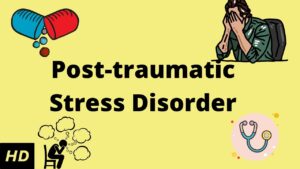Post-Traumatic Stress Disorder
 A distressing experience may lead to post-traumatic stress disorder (PTSD), a mental health condition. The incident could be risky, fatal, stunning, or even frightful. Examples comprise:
A distressing experience may lead to post-traumatic stress disorder (PTSD), a mental health condition. The incident could be risky, fatal, stunning, or even frightful. Examples comprise:
- Military combat.
- Natural disaster, such as a tornado.
- Physical abuse.
- Sexual assault or rape.
- Sudden death of a loved one.
- Terrorist attack.
You might have personally experienced the terrible occurrence or you might have witnessed it happen to someone else.
After an event like that, it’s common to feel angry. For a period, you might struggle to get enough rest, eat, or engage in activities you find enjoyable. However, PTSD symptoms interfere with your life and last for more than a few months.
Symptoms
PTSD symptoms vary from person to person. Still, everyone with PTSD experiences one or more of the following:
Avoiding things: You might stay away from those who or things that bring up the incident. Examples include acquaintances you made while serving in the military, the neighborhood where the tragedy occurred, or crowds in general. Some PTSD sufferers try to keep themselves occupied in order to avoid thinking about the incident.
Being on edge: You may find it challenging to unwind or enjoy the things you formerly did due to your disease. You can have jitters or worry. You can be quickly shocked or prone to assuming the worst. You can also have a hard time focusing or falling asleep.
Having negative thoughts and feelings: PTSD can make you feel negative, angry, sad, distrustful, guilty, or numb.
Reliving or re-experiencing the traumatic event: Flashbacks or dreams may appear as a result. Perhaps an unpleasant memory will suddenly spring to mind when you hear a car backfire or see something comparable (like a fire).
Causes
A traumatic event causes PTSD. But, we aren’t sure why some people get PTSD and others don’t.
PREVENTION
Some studies show that certain steps may help you prevent PTSD afterward:
- Ask for help and support.
- Believe that you can manage your emotions.
- Find positive meaning from the trauma.
- Focus on positive emotions and laughter.
- Help other people.
- Practice positive thinking.
- Stay in constant contact with important people in your life.
- Talk to loved ones about the event.
- Think of yourself as a survivor instead of a victim.
Homeopathy has treatment of all these complications
